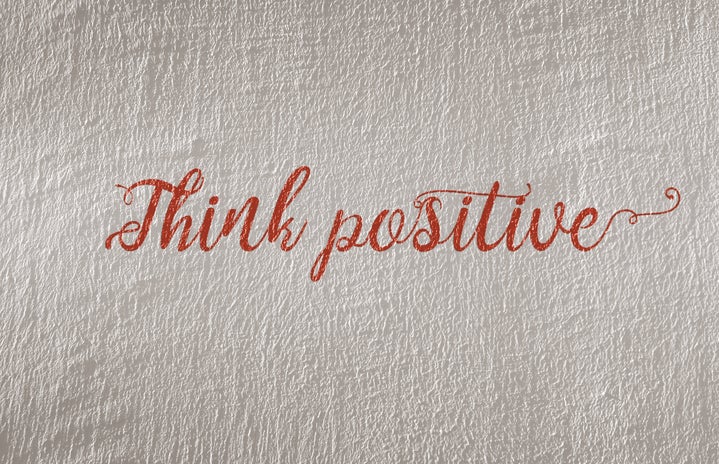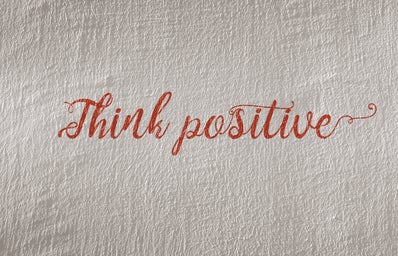Using affirmations to harness positive thinking is a tremendously powerful tool that I recommend to all who seek it. Affirmations can be traced from ancient Eastern religions; they are phrases or mantras that help to challenge and overcome self-sabotaging or negative thoughts. I understand repetitive positive statements may feel ridiculous or at times useless, but allowing for the manifestation of positive thought is the first step. Just as much as we need to participate in repetitive exercises to improve our physical health, we must also allow ourselves to be an active participant in the way we strengthen our mind and thoughts.
Someone once said, “You live most of your life inside of your head. Make sure it’s a nice place to be.”
I did not always meditate, do yoga and use positive affirmations. I believe certain things find its way to you when you need it most. There are times when we feel as if we have everything figured out — that we are on top of the world. There are other times when we feel alone, lost, confused and in pain. At the times when we feel that the world is against us — things stress us, people leave us — take that transformative time to understand yourself and strengthen your perception on the reality of the situation. I found yoga, meditation and positive affirmations in a time of despair and confusion. In simple terms, I wanted to feel better. I wanted to make myself better.
I found myself sullen and void of any emotion. I found myself going throughout my days without feeling anything at all. I found myself losing interest in my courses and where I was at in life. I found myself feeling severely trapped and lost. I could not find any song that I wanted to listen to on commutes, so I sat in silence.
One day, I discovered a podcast that sparked my attention. I figured if a song could not brighten my mood maybe I could listen to someone speak in-between my bus rides to and from classes. It was a podcast on health and wellness that dove deep into spirituality, positivity, community, psychology, science, mantras, meditation, self-worth, healing, purpose, love and an infinite amount of other related topics. I’m not sure if we realize it, but when we are down and can’t find light, light finds us. Topics such as these may seem insane to most, or maybe it was society who told us self-actualization and finding meaning was silly — out of irrational fears that others would realize their full capacity and do more than us. But when we seek to feel something, we try anything. I was open to new thoughts and ideas.
While I was listening to the podcast, I found myself less alone with my thoughts and more in tune with the way I was going about my day. The man speaking in the podcast asked his guest about his morning routine. The man responded that he prioritizes sleep so that he can feel awake and present each morning. When he wakes up he does not go on his phone and check social media, news, emails, or daily disruptions that cause massive amounts of unnecessary anxiety. Instead, he meditates. Meditation seems too simple to be true, but I would try it. There are many types of meditation but he focused on two. One, being focused or mindful meditation. I’ve spoken on this in a previous article, but it is essentially the awareness and focus on your breath. He starts off every morning by deeply breathing in for 3 seconds, holding that breath for 4, and releasing it for 5. Once he completes a few minutes of that form of meditation he goes into mantra meditation.
Mantra meditation is where you can use positive affirmations in order to shape your day. Positive affirmations can be anything you want. He starts off each morning by asking 4 simple questions:
“Who am I?”
“What do I want?”
“What is my purpose?”
“What am I grateful for?”
Ground yourself and answer honestly when you ask yourself these questions when you wake up. Start each day by asking, “who am I, what type of person do I want to be?” Ask yourself, “What is one small thing I can do in order to get closer to reaching my goals?” It seems simple, and it is. Admitting things to yourself and recognizing these thoughts will allow you to transition these thoughts into action. The affirmations I have chosen for myself are:
I am smart.
I am kind.
I am beautiful.
I am intelligent.
I am happy.
I am safe.
I am peaceful.
I am educated.
I am loved.
Affirm yourself of things you want to become. I know many or most of us do not feel this way about ourselves, and that is normal. We have to convince ourselves that we are the affirmations we tell ourselves each morning. You have the power to make yourself feel better when you truly believe in these affirmations of yourself. In repetition we can tell ourselves, “I am happy, I am safe, I am loved.” Because it is true, and you are.
Being present in your activities, your studies, your encounters, and your life is important. Find time for social connection and take the time to talk to one new person each day. Pay attention to the way your body works, which times of the day you focus best, and what your body needs. I have noticed that sleeping early, getting 8 hours of sleep, and waking up early to meditate and exercise makes a tremendous difference on my outlook of the day. Focusing on positive affirmations can you help you turn negative ones into positive ones. For example, when you think, “I am not good enough, I am not smart enough, I am lonely” allow your mind to transform those thoughts into “I am doing the best that I can, I can educate myself more, I can use time alone for reflection, self-care, and relaxation.”
Studies have shown that affirmations, “have been used to successfully treat people with low self-esteem, depression, and other mental health conditions. They have been shown to stimulate the areas in our brains that make us more likely to affect positive changes in regard to our health.The latter study suggests that a stronger sense of self-worth makes you more likely to improve your own well-being.”
I understand positive affirmations will not work for everyone. I understand some people do not think it is important to train our minds on how to think and be positive. I understand it may seem silly. I write for those who seek to make positive change. I write for those who feel like they cannot find good things within their day. If you do not believe in them, I ask that you respect those who do. For those who want to better themselves, I recommend preaching positive affirmations to yourself and pick your head up no matter how hard it may seem. I know nothing is easy and I know how hard it is to find light. But I promise light will find you when you are ready to let it in. I think, the actual power of affirmations is not some magical effect that will suddenly make our lives better, but the power it has to transform the way we look at ourselves and our life, our progress and our resilience. Affirm yourself until you actually start to believe it. Express gratitude, show compassion, and educate yourself as much as possible. We are all a work in progress and healing isn’t always a straight line up. We will always have things to work on and ways to make ourselves better. Many things will bring us down, but I promise you can and will always pick yourself back up. Good luck with finals, I wish you all the best. And always remember:
You are smart.
You are kind.
You are beautiful.
You are intelligent.
You are safe.
You are educated.
You are loved.
You can be happy.
You can be peaceful.
You can choose to let light in.
Thank you,
J



